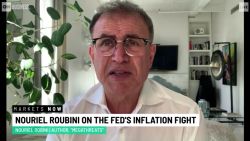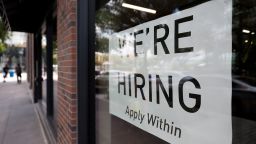A version of this story first appeared in CNN Business’ Before the Bell newsletter. Not a subscriber? You can sign up right here.
There’s lots of anxiety swirling about a possible recession. Is Corporate America starting to get nervous, too? We’ll get a better sense this week when several top financial firms and consumer companies report third-quarter earnings.
Asset management giant and iShares owner BlackRock (BLK) is due to report Thursday. JPMorgan Chase (JPM), Wells Fargo (WFC), Citigroup (C) and Morgan Stanley (MS) are just a few of the several top banks set to release results on Friday.
Wall Street will also be closely watching earnings earlier in the week from Dow components Walgreens (WBA) and UnitedHealth (UNH), Pepsi (PEP), and Delta (DAL) for clues about the economy.
“This earnings season is going to be a good test to see what management teams say and how much visibility they have” about future sales and profits, said Scott Ellis, portfolio manager at Penn Mutual Asset Management.
These blue chips are not only going to tell Wall Street how they did during the past three months. They are also likely to shed some light on what they expect in the crucial fourth quarter and possibly also give a glimpse at their 2023 outlooks.
Those insights might not be too rosy.
“Assuming there is a recession in 2023, current earnings estimates are likely too high,” said Shawn Snyder, head of investment strategy at Citi U.S. Wealth Management. “That could be the next leg down in the market, but it’s not yet factored in.”
Snyder said it’s possible that earnings could decline 10% next year from 2022 levels. But analysts haven’t slashed their forecasts that drastically just yet. According to estimates from FactSet, Wall Street is still predicting profit growth of nearly 8% next year.
Strong dollar in focus
Major American companies with significant overseas exposure could also get hurt by the relentless rise of the dollar. The robust greenback will hurt sales and profits for these firm’s international operations.
“The most interesting thing to watch for this earnings season is the dollar’s strength. It has had an absolute surge, and that will hurt multinationals,” Snyder said, adding that smaller US companies with less of an international presence may hold up better on the earnings front because currency fluctuations won’t hurt them as much.
Companies with a global sales footprint are starting to feel the pinch already. Jeans maker Levi Strauss (LEVI) blamed “the significant incremental currency headwinds from the stronger U.S. dollar” for its weaker-than-expected earnings outlook last week.
Major multinationals face other headwinds, too. Chip stocks, which already have been hit hard this year due to semiconductor supply chain woes, were dealt another blow last week when Advanced Micro Devices (AMD) warned of slowing sales ahead.
“The PC market weakened significantly in the quarter,” said AMD Chair and CEO Lisa Su in a press release. “While our product portfolio remains very strong, macroeconomic conditions drove lower than expected PC demand.”
Still, there should be some bright spots from this batch of earnings.
The banks should get a continued boost from rising interest rates, which makes lending more profitable. And unlike Europe, where investors are worried about problems at Credit Suisse (CS) and Deutsche Bank (DB), the top US firms don’t appear to be showing signs of financial strain.
“Bank balance sheets and capital positions both remain in solid shape,” said KBW analyst David Konrad in a bank earnings preview report. Konrad has bullish ratings on Goldman Sachs (GS), Bank of America (BAC) and Wells Fargo.
Inflation peaking at last?
Banks may be benefiting from higher interest rates, but most investors (and consumers, of course) are hoping inflation finally begins to cool enough to justify a slowdown in the pace of rate hikes by the Federal Reserve.
Whether or not the Fed can start thinking about a pivot will largely depend on the incoming inflation data. The US government will report the latest monthly reads on consumer prices and wholesale prices next week.
The consumer price index, or CPI, is the one investors will be watching most closely. CPI surged 8.3% over the past 12 months through August. Economists are forecasting a slight cooling off for September, to 8.1%.
Wall Street is betting the producer price index, or PPI, will slow as well. Forecasts call for a 8.3% jump in PPI through September, down from an 8.7% annual increase in August.
“Inflation numbers are coming down. There is no doubt about it,” said Michael Sheldon, chief investment officer at RDM Financial Group. Sheldon noted that there have been big drops in commodity prices such as lumber, steel and copper as of late.
One big problem for the Fed is that wages are a big component of the inflation picture — and that number is still historically high, even with wage growth slowing a bit to 5% year-over-year in September.
“Wage growth is not as low as it needs to be for the Fed to take comfort,” said Luke Tilley, chief economist at Wilmington Trust.
Sheldon said the Fed would like to see wage growth dip to about 3.5% before it feels that inflation is truly under control.
It’s also not clear just when surging prices will really start to put a major dent in consumer spending. Retail sales surged 9.1% year-over-year in August, a sign that shoppers are holding their noses and continuing to buy despite the sticker shock. The government will report September retail numbers on Friday.
Up next
Monday: US bond market closed for Columbus Day/Indigenous Peoples’ Day; Nobel economics prize announced
Tuesday: IMF world economic outlook; Meta Connect event
Wednesday: US producer price index; Microsoft (MSFT) Surface event; earnings from Pepsi
Thursday: US consumer price index; US weekly jobless claims; earnings from Taiwan Semiconductor (TSM), Walgreens, Delta, BlackRock and Domino’s (DPZ)
Friday: US retail sales; US U. of Michigan consumer sentiment; China inflation data; earnings from UnitedHealth, JPMorgan Chase, Wells Fargo, Citigroup, Morgan Stanley, US Bancorp (USB) and PNC (PNC)
























